Biden said Trump-era family separations were 'abhorrent.' So why is DOJ fighting relief claims?
- Oops!Something went wrong.Please try again later.
- Oops!Something went wrong.Please try again later.
The question from a Phoenix immigration supervisor came in on her BlackBerry: Should a parent and child apprehended at the border be separated? The response from Michelle Lee, an administrator with Immigration and Customs Enforcement in Arizona, came back in two minutes: yes.
That is among many inside details of the most controversial of the Trump administration’s “zero tolerance” efforts that are woven through recently unsealed court documents related to nearly 40 lawsuits filed against the government.
As one of his first actions in office, President Joe Biden followed through on a campaign promise when he vowed to end the “moral and national shame” of his predecessor’s immigration policies and halt the prosecution of parents for often minor immigration violations that were used to justify the separations.
Yet today, the Department of Justice is actively defending those very policies in court. By doing so, it in effect is asking families to decide whether reliving their pain is worth a potential payout. Families and their attorneys say they shouldn’t have to make that choice.
One mother separated from her children in 2018, who spoke to USA TODAY on the condition of anonymity for fear of reprisal, said she was disappointed that the U.S. government is fighting to deny them justice.
“My children may be forced to go through daylong questioning by government lawyers and medical examiners who will try to blame me for what happened to them,” she said in Spanish. “I’m terrified that they’ll be taken away from me again and forced to relive the trauma of the separation. Families like mine have suffered enough.”
'Hold the government accountable' Parents separated from their kids at Arizona border are suing the US.
The conflict between policy and action comes down to protecting the powers of the presidency and reducing future payouts to the families.
“It’s ironic that while candidate Biden said that family separation was abhorrent, as a president he’s allowing his Justice Department attorneys to fight these cases,” said Stephen Yale-Loehr, a professor of immigration law practice at Cornell University. But, he said, “every administration wants to preserve its flexibility and discretion on immigration, because immigration affects our sovereignty and foreign affairs.”
Monetary settlement talks have fizzled, although some of the attorneys for the families continue to hold out hope for an agreement. Some of the lawsuits that have advanced the furthest in the legal process are under protective orders, so attorneys are not allowed to discuss the specifics of the cases or the interrogation of families. As the cases move forward, however, they are preparing to prove their claims, including by preparing their clients for depositions.
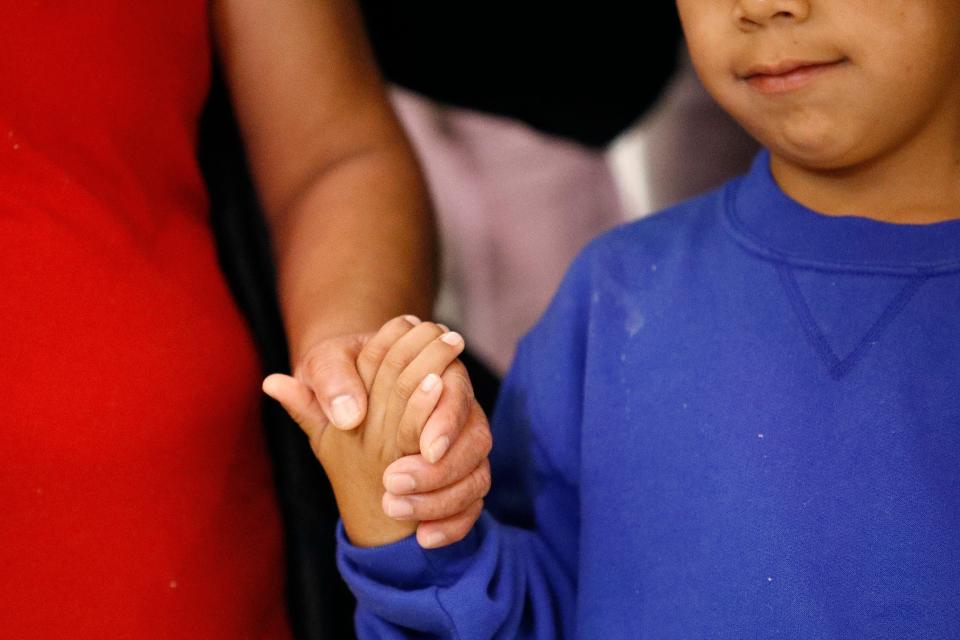
White House spokesman Abdullah Hasan didn’t answer questions about why the administration is fighting the tort claims, saying it does not comment on active litigation. He noted that the president has asserted that “the Trump administration’s family separation policy was abhorrent, unconscionable, and violated every notion of who we are as a nation.”
“That’s why President Biden on his first day in office ended the Trump administration’s family separation policy, and he created a task force that has worked every day since to reunite and support the families that were torn apart,” Hasan said.
More than 3,900 children were removed from their parents under Trump's policy, officially established in April 2018 but piloted for months before that, according to Biden's Reunification of Families Task Force. About 860 children have yet to be reunited, according to the group’s latest report.
Details surrounding the policy’s creation and implementation have trickled out over time. The new trove of documents include internal conversations among government officials, not all of whom were on board with the plan.
Agencies lacked a coordinated tracking system for separated families. They struggled to connect parents and children via phone. And in one instance a field director weighed whether a father’s past drunken driving convictions should be enough to split the family. It was, he determined; but, he added, “other officers could reach different conclusions.”
Jonathan White, who oversaw the federal program that houses migrant children, said in his deposition that he opted not to express his concerns about plans to separate migrant families during a February 2017 meeting with high-ranking Department of Homeland Security officials. He feared it would backfire.
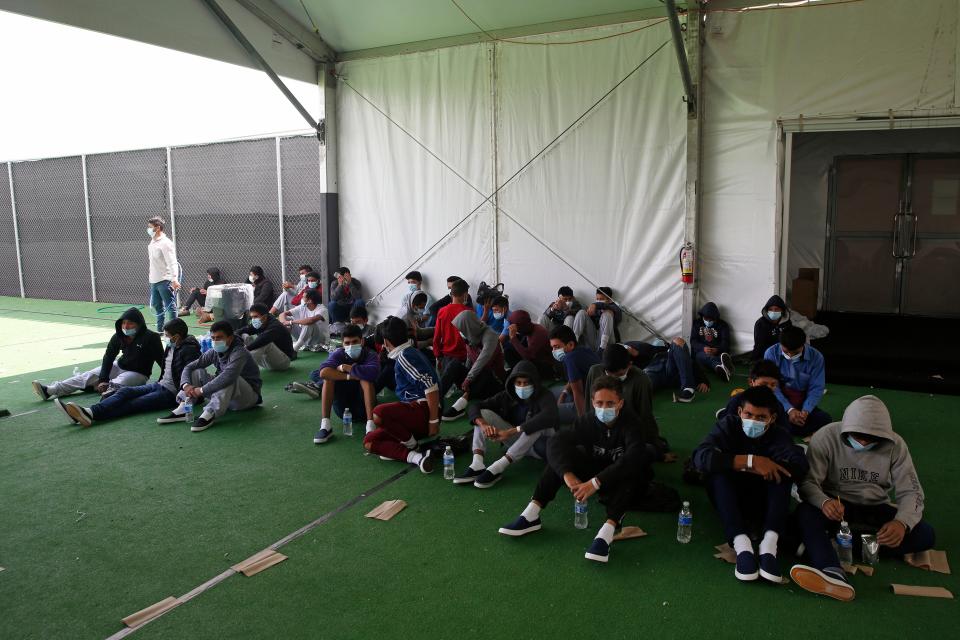
“It was my understanding that the purpose of the deterrence was to, to send a message, and that would – that if I raised the issues of the harm to children and families, that might be exactly what would make them want to do it more,” White said in the deposition.
“And so in other words, one of the purposes of the policy was to harm children and families, in your understanding; is that correct?” an attorney for the families asked.
A government attorney objected. Then White answered, “Yes.”
Lawyers claim DOJ could retraumatize families
Biden’s Justice Department inherited the defense of the first 11 family separation lawsuits filed under the Federal Tort Claims Act when he took office in January 2021. Since that time, attorneys for separated families have filed 28 additional lawsuits. One has been settled.
Each lawsuit is moving through the courts at a different speed. The ones filed the earliest, during the Trump administration, are reaching the discovery stage, where attorneys can request information from one another to bolster their claims.
That includes seeking depositions from border and immigration officials. It also opens the separated families named in the lawsuits to potential questioning not just by their own attorneys but by government lawyers and experts, whose jobs will be to poke holes in their arguments and weaken their claims for compensation.
The government has “chosen to be very aggressive in fighting these cases and doing everything it can to retraumatize these families in order to discourage them from seeking compensation,” said Zachary Manfredi, litigation director for the Asylum Seeker Advocacy Project, which is representing three of the families.
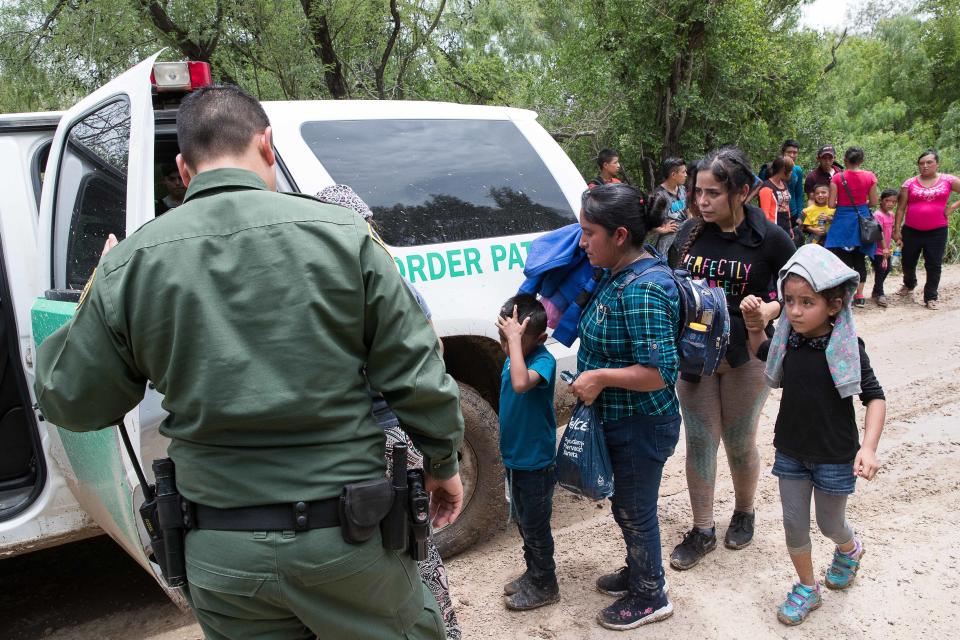
Court records offer details about some of the efforts to probe the experiences of these families. In November, a federal judge in Phoenix granted the Justice Department’s motion requiring 11 parents named in two lawsuits – C.M. v. United States and A.P.F. v. United States – to have independent psychological examinations.
In her order, U.S. District Judge Susan Bolton said it was a question of fairness to allow the Biden administration “to have an expert make a mental health evaluation” of the families seeking compensation for the trauma they say they experienced.
Bolton also set parameters for how the examinations would happen, limiting them to parents, not children. She agreed with the Justice Department’s request to allow for up to eight-hour examinations but said they should take place in the state where the families live.
She sided with attorneys for the families in ordering that the examinations be recorded with video and audio “so that there will be no issues concerning a language or translation problem or inappropriate questioning.”
Public court records do not provide more information about the examinations. They do show that in the following months, the Justice Department deposed seven mental health professionals with expertise in immigrant children and trauma. Attorneys for the families deposed three experts as well.
In another case out of Florida, RYMR v. United States, unsealed documents show the Justice Department planned to depose a child who was 3 at the time of his separation from his father at the Texas border in November 2017. The child’s attorneys said he would not testify in the deposition or in court if the case goes to trial.
“Doing so would be too traumatic,” said Lee Gelernt, deputy director for the ACLU’s Immigrants’ Rights Project. “But he was subjected to a lengthy exam by a government-paid psychiatrist who the government hired to try and say that the child and parent didn’t suffer trauma from the separation.”
The ACLU is litigating that case and two other family separation lawsuits. Gelernt also was lead counsel in the class-action lawsuit filed in 2018 that forced the Trump administration to end the separations and reunite the families.
‘All I wanted was to speak with her’
A father from Guatemala had a problem: Immigration officers wouldn’t tell him where his daughter was after she was taken from him at the Arizona border.
In one of the unsealed records containing a brief excerpt of his depositions, the father told an attorney that he felt pressured to sign a document agreeing to be deported, even though he couldn’t read it because it was in English.
“Well, the document I had to sign was about if I was deported, and my daughter would leave with me,” the father said. “I signed that document because all I wanted at that time was to be deported with my daughter.”
Court documents also show that even when migrant parents complied with the government’s requests, access to their children was limited.
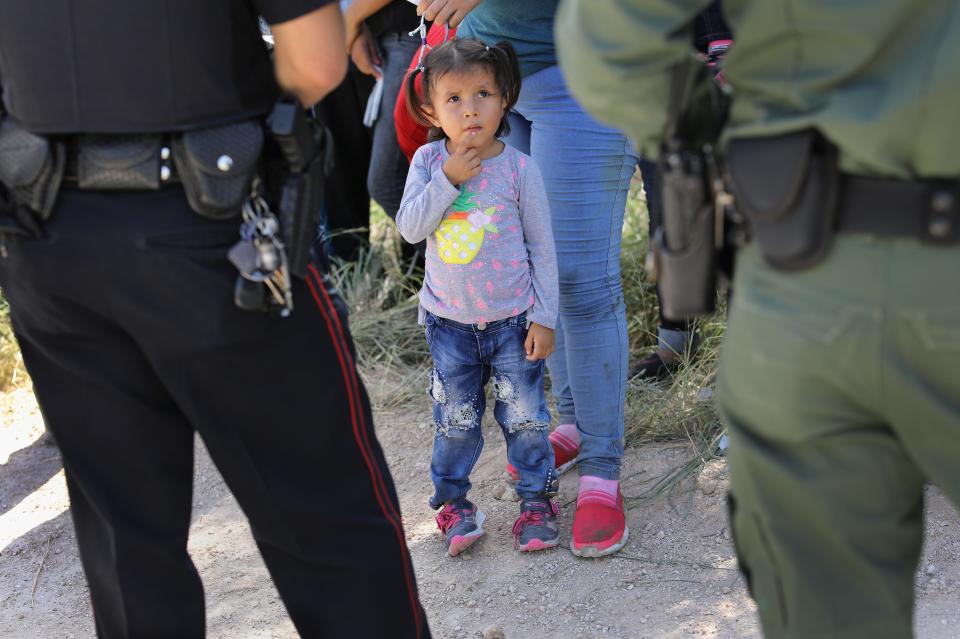
The Guatemalan father explained that after immigration officials deported him without his daughter, he tried to stay in contact with her in the United States. He would try to call her four times a week, he said in his deposition, but his daughter’s social worker would connect him to her only about half of the time.
“All I wanted was to speak with her,” he said.
The father was not the only parent struggling to reach a child. Tae Johnson, an assistant director at the time and acting director of ICE through June, wrote in a June 2018 email filed with the court that the phone line connecting callers to migrants in detention was at one point receiving more than 700 calls a day. There were only 10 operators to answer those calls; they turned off the ability to leave voicemails.
Although illuminating testimony like that of the Guatemalan father could help the plaintiffs’ case, their attorneys worry that reliving the separations could be too wrenching. Catherine Weiss, chair of the Lowenstein Center for the Public Interest who represents some of the parents and children, said she must explain to families what will be required in court depositions and what might be uncovered during the discovery process.
Weiss knows some will still want to move forward because of the “profound hurt” they suffered. Others will opt out. The public might have moved on from its outrage over the family separation process, Weiss said, but many of the families are still facing deportation proceedings.
She said that often in such cases negotiations with the government lead to accommodations to make it easier for the families, such as limiting depositions to a few hours rather than a full day.
If the government presses ahead instead of settling the case, Weiss said, “it should take every step it possibly can to minimize the harms to the families, including avoiding unnecessary depositions or psychological examinations of children.”
Why hasn’t the Biden administration settled?
Immigration advocates and attorneys representing separated families had hoped that the Biden administration would create a global settlement fund to compensate all the separated families, not just those suing. After almost nine months of negotiations under his term, attorneys for the Justice Department walked away.
As a result, litigation on the family separation lawsuits filed in federal courts resumed and attorneys for the families are gearing up to prove in court how the policy hurt their clients.
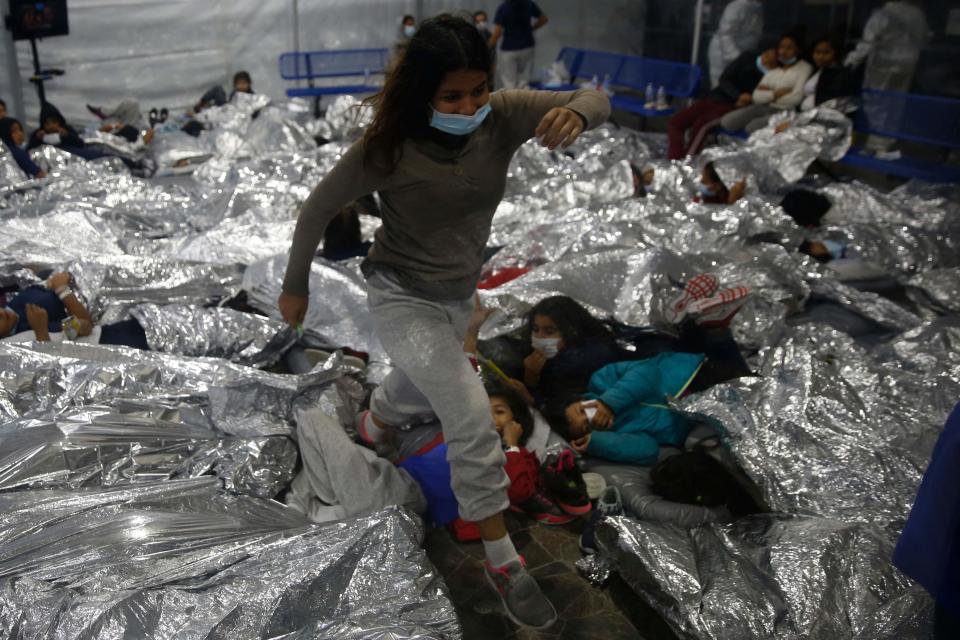
“For the families we represent, I don't think any amount of compensation will feel like symbolic justice. I don't think anything will feel like justice,” Weiss said. “The harms are so severe and the trauma is so intense that I think no matter what the government pays them, they will feel like they're suffering a completely unforgivable wrong, which is, in fact, the case.”
Presidential scholars said that while it might be surprising to see the Biden administration defending a policy that Biden has spoken out against, continuing to pursue these cases makes sense from a legal perspective.
Neal Devins, a professor of law at the College of William and Mary in Virginia, noted that presidents are usually “interested in interpretations of the law that expand the boundaries of the presidential power.” The Justice Department could be pushing back not just to limit the government’s liability in these separation cases but in others that could be influenced by the outcomes, he said.
Devins added, however, that presidents frequently shift their interpretations of what they deem constitutional. The Justice Department under President Barack Obama, for example, had fought against legal challenges to the Defense of Marriage Act, a measure that effectively limited marriage to a man and a woman. But Obama eventually reversed his stance and instructed the Justice Department to no longer defend the law in 2011 – about two years before the Supreme Court struck down the provision.
Efforts by the Biden administration to defend the family separations in court could come at a steep price.
In addition to court fees and expenses for the 39 lawsuits to date, if the federal government loses it could face millions of dollars in compensation – potentially far more than a combined settlement. (Although the government settled the one lawsuit in April, the amount is confidential.)
Without a global settlement fund, Gelernt said, going through the federal court system could shut out most of the families, especially those who did not have attorneys or declined to pursue a claim.
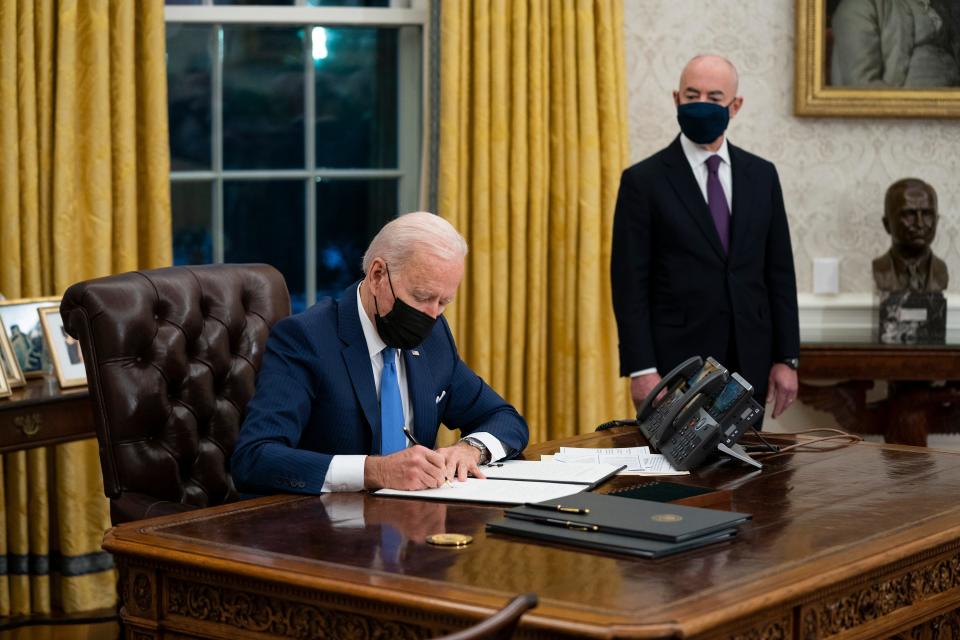
“Ultimately what people need to understand is the administration is not opposing these cases on the grounds that people are asking for too much money,” he said. “The administration is asking point blank for these cases to be thrown out of court and the families need not be given a single penny.
“That is a position that the Biden administration should not be taking, and I believe will come to regret when it's all said and done.”
When USA TODAY Network reporters asked the Department of Homeland Security what its policy is for separating families, it declined to comment and referred questions to the Department of Justice. Dena Iverson, a Justice Department spokeswoman, directed USA TODAY to an agency response from 2021, after monetary negotiations between the administration and families fell apart.
“While the parties have been unable to reach a global settlement agreement at this time,” the statement read, “we remain committed to engaging with the plaintiffs and to bringing justice to the victims of this abhorrent policy.”
‘Logistics nightmare’ predicted to reunite families
The unsealed documents offer previously unknown details about the logistics of separating families and expose internal disagreements among government officials charged with implementing the policy. A federal judge in Phoenix unsealed them in May, acknowledging public interest in the matter.
They show that an employee from ICE’s Enforcement and Removal Operations raised concerns in October 2017 that splitting families would require more work in “caring, housing, transporting, & court proceedings of UAC (unaccompanied children) & adult detainees.” The staffer warned that it would create more work to ensure that children could speak with their parents. The staffer also said it would be a “logistics nightmare” to reconnect the children to their parents when it came time for them to be deported.
That message apparently reached Thomas Blank, then chief of staff for ICE. In a separate email, another staffer wrote to Matthew Albence, the ICE official who oversaw enforcement and removals, that the note concerned Blank and “arguably contradicts our recommendation.” Blank would need Albence’s approval before moving forward.
The sender, whose name is redacted, had addressed the message to “ICE Exec Sec” and copied other chiefs of staff in the removal unit.
Albence forwarded the message to Johnson, then the assistant ICE director, and wrote, “?????!!” In a follow-up message, Johnson reprimanded someone listed as a chief of staff in the custody management who had let the note from the enforcement office get through.
“He was freaking babbling,” Johnson wrote of the message. “We cannot send up anything from JFRMU (Juvenile and Family Residential Management Unit) that is not chopped on by (Name redacted) and I.”
The unsealed documents also reveal how agents interpreted their marching orders to enforce the “zero tolerance” policy.
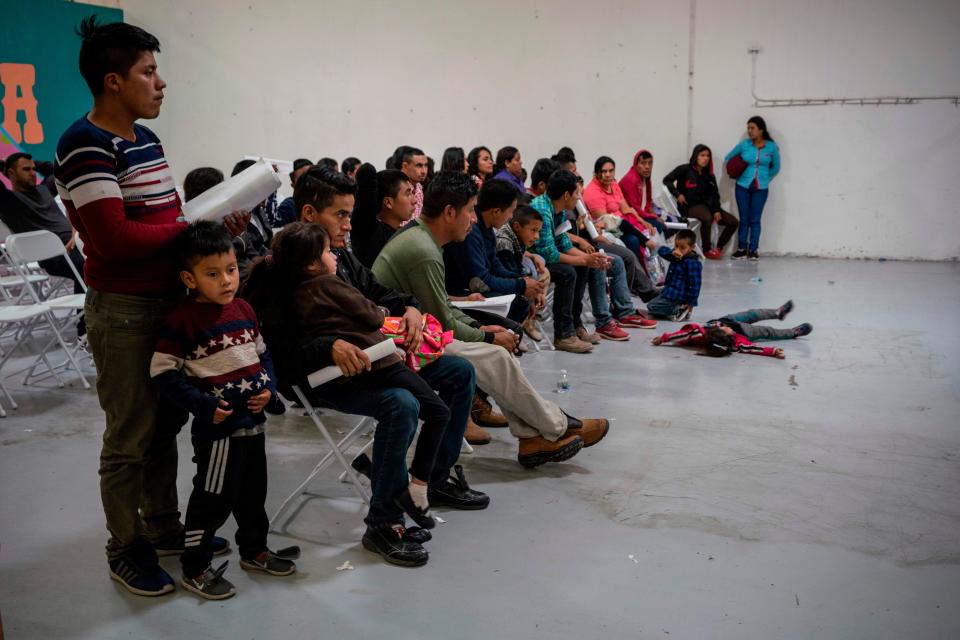
Shawn Jordan, a special operations supervisor for the Border Patrol in Arizona when the policy was in place, said in his deposition that once they determined “we intended to refer that adult for prosecution,” the child was separated from their parent.
The attorney questioning Jordan asked why they didn’t wait for a decision from a prosecuting attorney. Jordan responded that would mean retaining custody of the child longer, which was not practical. They had limited capacity to hold children and agents had other competing duties.
“I believe that that was not a tenable solution,” Jordan said.
The documents also show how quickly administrators moved to split parents from their children. Lee, the ICE administrator who approved a family separation in about two minutes on her Blackberry, responded “yes” in a 2022 deposition when an attorney asked, “Is that something you would typically do, is send − send an email regarding a family separation after reviewing it on your Blackberry?”
Lee went on to to explain her quick decision, saying the parent, who had a criminal history, was a “mandatory detention case.” She added it was “not something that I would have spent extensive amount of time, no.” She did tell the questioning attorney that it was possible a staffer had briefed her about the case but she couldn’t remember.
In another instance, Lee approved splitting a family after about half an hour because the father had a “criminal history and a prior immigration final order.” Lee stated she was following a policy that applied to ICE field offices but couldn’t recall it.
The criminal histories border officials relied on to split families varied widely. Some parents had past felony convictions, some had been dinged for such crimes as using fake identification. Often, the act of crossing the border illegally was enough.
What happens next to the families and their cases?
When the depositions and the discovery process conclude, attorneys for the Justice Department and the separated families can file motions for summary judgment, using the facts they collected to reinforce their arguments.
The judge can then rule in favor of the Biden administration and dismiss the families’ claims, or side with the families and decide they are entitled to compensation. If the latter, the question will then become: How much?
Under the Federal Tort Claims Act, the presiding judge, not a jury, decides during a bench trial. The ACLU’s Gelernt said bench trials could begin as early as this fall if judges rule in favor of the families.
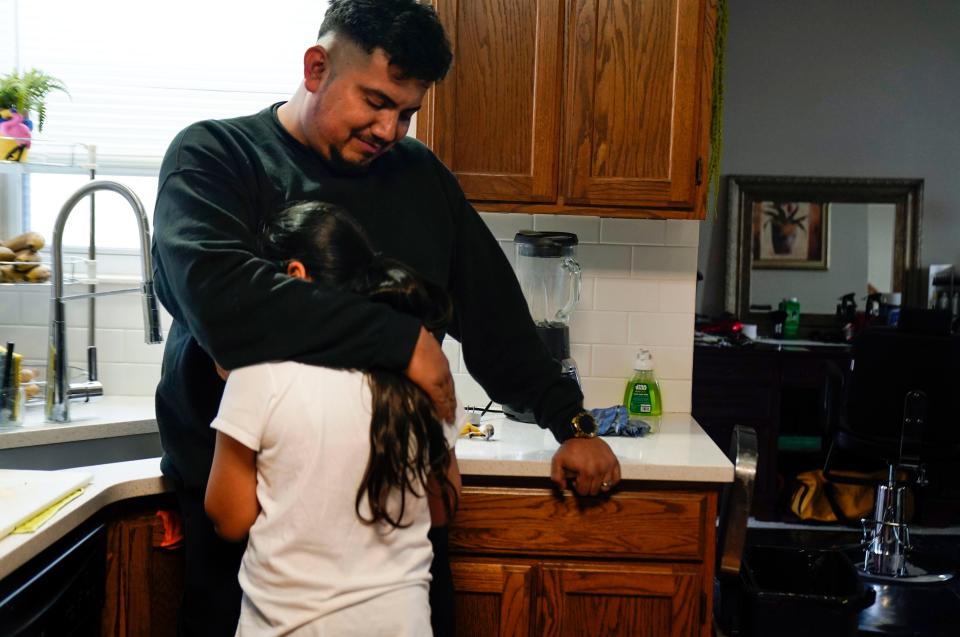
Even though settlement talks for financial compensation broke down in 2021, Gelernt said, separate negotiations over non-monetary issues continue. That includes things such as trauma care for the parents and children and legal status for the families.
“Those settlement talks have been constructive and are hopefully going to lead to a comprehensive settlement that involves finding the remaining families, reunifying the families, hopefully providing a pathway to apply to remain in the United States,” Gelernt said.
When the Biden administration first created its task force, the Homeland Security Department began offering humanitarian parole on a case-by-case basis to the separated families. That allows them to stay in the U.S. for three years, work here and access behavioral health services. As of May, DHS has processed more than 4,800 parole requests, according to the task force.
Attorneys said some of the families have claimed and received asylum in the United States. Others remain caught up in removal proceedings and could end up with deportation orders.
“The crisis is not over for these families,” Weiss said. “It's not even close to over for these families.”
Have any news tips or story ideas about immigration in the Southwest? Reach the reporter at rafael.carranza@arizonarepublic.com, or follow him on Twitter at @RafaelCarranza. Chris Quintana is an investigative reporter at USA TODAY, and he can be reached at cquintana@usatoday.com or via Signal at 202-308-9021. Joey Garrison is a White House correspondent for USA TODAY. Reach him on Twitter @joeygarrison.
This article originally appeared on USA TODAY: Separated families face skepticism from Justice Department in court

